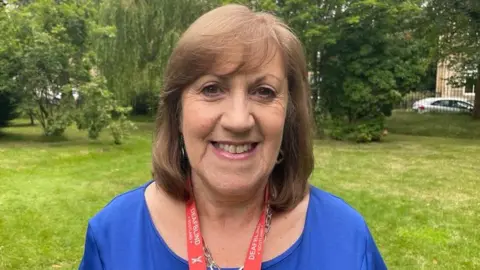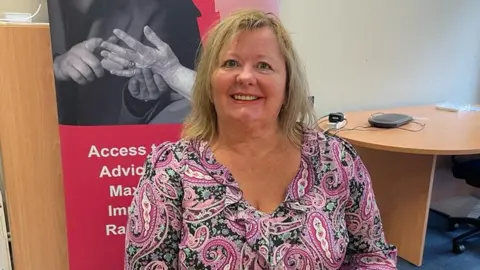Scotland's new disability benefits system comes into force
 BBC
BBCThe Scottish government has begun taking over adult disability benefits from the UK government.
Until now, personal independence payments (PIP) or disability living allowance (DLA) have been provided by the UK government.
They are being replaced in Scotland by the new adult disability payment.
The process of automatically transferring recipients over is now under way, and the Scottish system is open to new applicants.
Scottish ministers have said that the process of applying for the new benefit will be "more compassionate".
The changes have been welcomed by disability groups, although opposition politicians described them as "a missed opportunity".
About 300,000 people in Scotland receive PIPs, while about 39,000 people are in receipt of DLA.
PIPs help people aged 16 to 64 cope with the extra costs they face due to ill health or disability, and are gradually replacing the DLA.
People already receiving either of those benefits will be automatically transferred onto the new adult disability payment over the coming years. That process is expected to be completed by the end of 2025.
The Scottish system has indefinite awards, where people with a long-term health condition or disability which is unlikely to change will not need to reapply or be re-assessed for their benefits.
There will also be short-term financial assistance to people awaiting appeals, and the criterion for terminal illness has been changed so that anyone with a terminal diagnosis will be eligible.
Under current rules, terminally ill people are eligible for PIP only if their death is "reasonably expected" within six months.
 PA Media
PA MediaPeople who are not already receiving disability benefits, but believe they might be entitled to them, can apply by filling out a application form.
Helen Stevenson, a welfare rights officer at Deafblind Scotland, said the new payment should be a "big improvement" and "a lot fairer".
She said the application form was much bigger than under the old system, and predicted that people would need help to complete it.
However, she said the application booklet also contained "much more information" in a bid to make the process accessible.
"It will give us a bit more work but we're happy to do that to make it fairer and easier to access for people," she added.
'Fairness and trust'
Social Security Minister Ben Macpherson acknowledged that the application process may mean it takes "a little longer" for people to receive benefits.
He said this was because they wanted to "get it right the first time".
Mr Macpherson added that the Scottish system will not ask claimants to undergo "undignified physical and mental assessments" and will remove the private sector from the process entirely.
The application process for PIP has been controversial with many disability campaigners and charities over the years. It has faced accusations that the process is complicated and that the medical assessments claimants are asked to undergo are "inhumane".
Mr Macpherson told BBC Scotland: "We will treat people with dignity, fairness and trust from the beginning."
The new system has been welcomed by disability groups.

Jackie Robertson, who has significant sight loss after a brain haemorrhage, described applying for PIP as "a complete nightmare from day one".
"At one point, I was so upset by it that I thought I'm giving up," she said.
"But then anger kicked in, because I thought, I've never claimed for anything in my life."
She also welcomed the changes, although she said had not been aware that they were taking place.
Citizens Advice Scotland said the new system was a "huge change" because medical assessments would be a last resort.
'Meaningful changes'
But it added that the benefit "largely replicates PIP and uses the same points system", so was still working within a system which disadvantages claimants.
Scottish Labour branded the new payment a missed opportunity and said the SNP was "tinkering around the edges".
"Even once these long-awaited payments are finally in place, disabled people will still be waiting years for any meaningful changes," said Pam Duncan-Glancy, the party's social security spokeswoman.
A Department for Work and Pensions spokesman said: "We support millions of people every year and our priority is they get the benefits to which they are entitled as soon as possible, and to ensure they receive a supportive and compassionate service.
"Reviews are a key feature of the benefit and ensure that payments accurately match the current needs of claimants."
